

Knows mo itey ?: Dissecting the ins and outs of Filipino gayspeak
More than just as a trendy social dialect, gay linggo is a language that connects the LGBTQ+ community together.
- Post author By Magz Chin , Juliana March Mendoza
- Post date June 24, 2022
- No Comments on Knows mo itey ?: Dissecting the ins and outs of Filipino gayspeak
“ Sinetchiwerikyelz? ‘Pag na knowzik itez ng pudra, tegibels everybody in this country!” Vice Ganda exclaims in the 2015 film Beauty and the Bestie . To the average Filipino, the meaning behind these sentences may feel obscure; but to the fluent gay lingo speaker, it’s as clear as day.
(Who are you? Once my father finds out about this, you will all die!)
Vice Ganda’s lines are just one of many instances where Philippine gay lingo—also called beki language—is incorporated into popular media and culture. From movie scenes and YouTube videos to internet challenges and social media memes, local gayspeak has indeed become part of Filipino culture. But many still wonder how the language works, and how it continues to thrive despite its ever-dynamic nature.
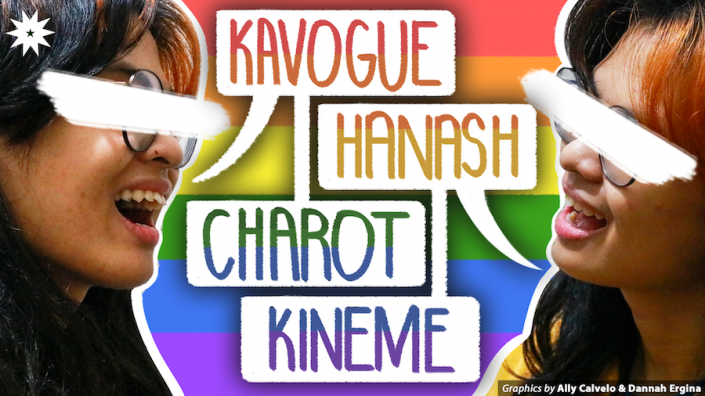
Speaking life through language
“We refer to [Philippine gay lingo] as a sociolect,” states Jesus Federico “Tuting” Hernandez, associate professor at the University of the Philippine’s Department of Linguistics. Just like any sociolect, it’s centered around the speakers. “Wala namang isang body o isang komisyon that would tell you, ‘This is how it’s supposed to be,’” he jokes. Therefore, it doesn’t follow a standardized or strict set of grammar rules other languages have.
(There’s no body or commission that would tell you, “This is how it’s supposed to be.”)
It’s no surprise then that the language is as colorful and alive as its community’s culture. For Carlos Calo (III, PSM), gay lingo is the community’s avenue of expression. But to him, it’s more than just a language. “It’s part of our way of life—how we talk with one another and how we get our messages across,” he shares. Film writer-director Rod Singh speaks in the same vein. “Personally, I practice [ beki ] language more often because may sense of empowerment on my part knowing the history of gay lingo,” she expresses.
However, gayspeak back then wasn’t as vibrant as it is today. Its roots stem from a time when the Filipino LGBTQ+ community hid behind the shield of the language to keep themselves safe. “People [used to] practice gay lingo to create a space for [the community] without the fear of other people eavesdropping on their conversations,” Singh says. A secret language of sorts, it exists to conceal the true messages of its speakers as a form of protection from non-queer individuals or non-allies. The term “Julie Yap Daza”, for instance—which means huli or “to get caught”—was often used by gay men in the 80s to warn each other when policemen were in sight.
Thus, “[Gay lingo] is rooted in the experiences of the LGBTQ+ community in the Philippines [where] there’s really a need to sometimes veil conversations to avoid cultural violence,” Hernandez reaffirms in Filipino. But what was once a way to fend off the Philippines’ heavily patriarchal and heteronormative society, gay lingo now connects users—whether queer or not—in a community full of love and support.
Knowing me, knowing you
Yet, mastering the art of gayspeak isn’t as easy as it sounds; its intricacies lie in its hyperdynamic nature. “ Ang bilis-bilis magbago [ ng gay lingo] kumpara dun sa …campus-speak, or other social dialects,” Hernandez notes, emphasizing how external factors—like other languages and popular trends—contribute to the enrichment of the beki language. To this, Singh echoes Hernandez’ statement, “You can just invent a gay lingo right now and expect some of your friends to understand what you’re saying because you all know your codes.”
(Gay lingo rapidly changes compared to campus-speak or other social dialects.)
For example, she recalls a time when “Julie Yap Daza” became outdated. Instead, she heard a friend use “pearly shells” to signify a person who got caught. She was initially confused at the term until her friend cusped their hands together—mimicking a person in handcuffs—akin to a variation of the Pearly Shells dance. This was when she truly understood how deep gay lingo can get, “ Talagang pa witty han kayo ng construction. Parang imbento ni bakla ‘tong salitang ‘to pero nage gets mo .”
(It’s really about being witty in your construction. Some person may have just invented the word but you would understand it.)
But its fast-paced nature also serves as its downfall, as gay lingo doesn’t stay exactly the same forever. Some words can—in Hernandez’s words—“lose its power [and] become obsolete.” One example Singh points out is with the word bongga . “ Bihira ka nalang makakarinig ng bongga because bongga is already a Filipino word,” she attests. Thus, variations sprung up to keep the root word as unique as possible such as kabog , and more recently, kavogue .
(You rarely hear bongga because bongga is already a Filipino word.)
Case in point: the term “Lupita Kashiwahara”. “Many don’t know [who] Lupita [is; she] used to be famous,” Singh demonstrates in Filipino, “but [in gay lingo,] Lupita means malupit or cruel.” With the constant societal changes influenced by popular culture and social media, antiquated words, phrases, and references are bound to disappear over time. However, Calo justifies this phenomenon as a means of “constantly communicating with the other members of the community” to create fashionable and more acceptable vocabulary.
As such, nothing is really set in stone for gay lingo. “ Hindi rin kasi monolithic ‘yung [local LGBTQ+ community],” Hernandez notes. “ Meron mga grupo na iba-iba ‘yung mga background, iba-iba ‘yung mga socioeconomic status, at iba’-iba rin ‘yung mga access [points] to popular culture.” With a plethora of LGBTQ+ centered shows like Drag Race Philippines —bound to introduce smaller pockets of gayspeak found in the Philippines—the linguistics professor is confident gay lingo is here to stay.
(The local LGBTQ+ community is not monolithic. There are groups who have different backgrounds, different social classes, and different access points to popular culture.)
This is why Calo appreciates scrutinizing the language. “Gay lingo represents how the LGBTQ+ community perceives the world and how to express themselves in this world,” he jets. This shared mode of communication is what links the tightly knit Filipino queer community even more. “[It] is the same thing that the Filipino language makes us Filipinos.” Singh reminds. “‘ Yung importance sa akin [ ng gay lingo ay ] ‘ yung how the language defines [our] sense of community.”
(The importance of gay lingo to me is how the language defines our sense of community.)
This liberty with which speakers create their own terms only proves how beautiful Filipino gay queer culture is. Truly a test of one’s wits, the local gay language is filled with codes that are not just limited to words and phrases, but also queer experiences. So for those who want to immerse themselves in the complexities of gayspeak and the LGBTQ+ experience, gorabells , mga dzai !
Share this:
- Click to share on Facebook (Opens in new window)
- Click to share on Twitter (Opens in new window)
- Click to share on Tumblr (Opens in new window)
By Magz Chin
By Juliana March Mendoza
Leave a reply cancel reply.

PINOY CLEVER WORDPLAY PART 2: GAY LINGO
- Post author By Christian Sy
- Post date October 1, 2021
- No Comments on PINOY CLEVER WORDPLAY PART 2: GAY LINGO

For the last installment of the two-part series about Pinoy clever wordplay, we will talk about the gay lingo. Bekinese, swardspeak, beki speak, whatever you call it.
For better articulation, we will be borrowing some words from Danton Remoto’s essay. It was read at the International Conference on Queer Politics, University of Amsterdam, July 1998. Remoto aptly raised three critical points about the Philippine gay lingo. He said that it serves as a mediator in the universe of Philippine languages, it comes from a carnival of sources, and the heterosexual mainstream has appropriated the language without considering that it is a language of slippages. You may read the essay here .
However, we will only focus on two additional points raised in the essay. The Philippine gay lingo has the capacity to disrupt , and that it is forever advent, forever beginning, forever new . While the language is no longer as exclusive as it was back then, notwithstanding the power of mainstream media and appropriation of heterosexuals, the Philippine gay lingo carries on with its sole purpose of creating an environment safe for the group of people using the language, the LGBTQIA+ community.
Gay lingo: Capacity to disrupt
As early as the ‘60s, the Philippine gay lingo has played a role as a mediator of Philippine languages. The Tagalog-English code-switching gave birth to a more comical yet useful language. The act of using the names of TV personalities and influential people to describe something became a trend. You may think of it as codes used for operations or, let’s get closer, our peers and core friends. We often use codes or internal languages that are privy to our circles.

This is how the gay lingo was used before, and up to this day, we can still hear other people using it. With Ces Drilon unwittingly lending her name, you could either say Stress Drilon when you are stressed. You could also call someone Lotlot de Leon if the person is a loser. When it rains, you say , Julanis Morisette or when you need someone to be very specific, you say, Specify Pecache.
Despite the comedy out of the language, it is essential to note that it was used back then to ensure someone’s safety. It was used to make a statement, to disrupt, and to speak freely, or even shout on top of your lungs, without having to worry about the people around you knowing what you are trying to say. The Philippine gay lingo is a way of expressing liberation—free from scrutiny and free from harm. With its contrast in sophistication and vulgarity, you create a world with people who speak a language you can’t speak with just anyone else. If they can’t give you space to feel free, create spaces for yourself and others.
Today, gay speak thrives in almost every corner of every sector, industry, or group. We see rallyists using the language for dissent. We hear it on national TV. Our friends and families likely speak or at least know a thing or two about the language.
Gay lingo: Forever advent, forever beginning, forever new.
Just like any language, the Philippine gay lingo continuous to evolve. From the mere appropriation of TV personalities in the ‘80s, we now hear these street words being thrown out from time to time. One of which is charot .

While there are few references about the origin of the word, the earliest time it was used was in the ‘80s. Roderick Paulate played the role of Charot, for the movie with the same title, together with Vilma Santos.
The word, however, is a modified version of ‘ Charing’ , which is the word for when someone is joking around. You would often hear charot and charing used every after sentences. The word then evolved from Charing to charot, and now char, or chos. You can also hear these words spoken and written by people who do not identify as members of the LGBTQIA+ community.
The Philippine gay lingo may no longer be as exclusive as before, but it continues to serve its purpose of connecting with people from different walks of life. It is a powerful language that creates a bigger world for the marginalized sectors. It is a language by the community and a language that anyone can now understand.
While the language is free for anyone to use, it is important to remember why gay lingo exists in the first place—why there was a need to create an entirely different language and drift of words. It is a language borne out of people’s experiences of being outcast from the inner circles of society. The Philippine gay lingo is a common tongue that serves as a sword for those who continue to experience oppression and discrimination. It will continue to evolve without reaching obsoletion.

- Tags bekinese , Philippine gay lingo , swardspeak
Leave a Reply Cancel reply
Your email address will not be published. Required fields are marked *
From ‘Taroosh’ to ‘Tom Jones’
Mediating ‘local’ and ‘global’ queer discourses through filipino ‘gay lingo’.
- Victoria Gail Amos Social Anthropology, University of Edinburgh
This essay explores how student members of an LGBTQ+ rights organisation discursively navigate queer identifications and concepts of belonging, based on fieldwork conducted in Quezon City, Philippines. I argue that elements of ‘gay lingo’, one of many Filipino LGBTQ+ argots, establish interlocutors as members of both LGBTQ+ communities and ‘post-colonial’ Philippines at large, amidst prevailing cultural logics that situate them as external Others. Appropriating and subverting hegemonic structures of language, they utilise ‘local’ linguistic patterns and reference ‘global’ queer connectivity in their endeavour to embed themselves within both spheres, illustrating that global concepts are inevitably syncretised through local contexts.
- Endnote/Zotero/Mendeley (RIS)
- For Readers
- For Authors
- For Librarians
re:think - a journal of creative ethnography
ISSN: 2516-8088 (Online)
Contact us at: [email protected]

Supported by the School of Social and Political Science and the University of Edinburgh Social Anthropology Society .
Take Down Policy | Privacy Policy | Cookies | Website Accessibility Statement
Academia.edu no longer supports Internet Explorer.
To browse Academia.edu and the wider internet faster and more securely, please take a few seconds to upgrade your browser .
Enter the email address you signed up with and we'll email you a reset link.
- We're Hiring!
- Help Center

Effects of Gay language in understanding the meaning of English words

Related Papers
Kimberly H Cabantug
Denis Provencher
Gender Approaches in the Translation Classroom
Irene Ranzato
This chapter illustrates the results of a translation test/questionnaire aimed at verifying how MA and BA students of translation (English to Italian) responded to the translation of dubbed films and TV series featuring characters using words related to homosexuality. The study aims at shedding light on the degree of sensitivity and overall response to homosexuality-related issues by University students and on the strategies adopted both by the official adapters and by the students to bypass the objective imbalance between the English and Italian respective homosexual lexicons (Ranzato 2012). More in general, the experience is meant to enhance students' awareness of gender-related issues in the translation classroom. Go to https://www.palgrave.com/gp/book/9783030043896
The International Encyclopedia of Linguistic Anthropology
Studies of the language of queer speakers – i.e. speakers whose gender and/or sexual identities fall outside of the normative heterosexual binary – have followed a trajectory largely mirroring evolutions in the greater field of sociolinguistics. While early sociolinguistic research searched for large‐scale linguistic differences patterning according to broad macro‐social demographic differences, the field in recent decades has increasingly implemented ethnographic, context‐sensitive analyses exploring how individuals use language to construct and project a range of locally meaningful identities on the ground. In the same way, studies of speakers with queer identities were initially concerned with discovering linguistic differences between queer and straight speakers, but have increasingly come to emphasize the diversity of queer voices in various contexts and how these voices contribute to the construction of a range of queer identities.
Rusty Barrett
The Normal Lights
Helen Espeno Rosales
Digital Press Social Sciences and Humanities
Anggi Gustara
Shannon Weber
Suzan Tuğba Öner
Linguistic Perspectives on Sexuality in Education: Representations, Constructions and Negotiations
Łukasz Pakuła
Back in 2018 I witnessed an instance of verbal behaviour which-I believe-would be categorised as hate speech, for instance, in the UK, yet regrettably remains unpenalised in the Polish legal system. A social media group intended for teachers of English as a foreign language (EFL) in Poland, I used to be a member of, featured a post asserting that non-heteronormative students should not be treated on a par with the heterosexual majority. It contained denigrating and devaluating claims about such students. What is more bewildering and saddening, it was authored by a teacher. Would you expect an instant reprimand on the part of the group community defending the rights of such student minority? I certainly did. For this reason, I was rather taken aback to read only a few moderately critical comments that were followed with somewhat vehement replies by the author becoming even more verbally aggressive. My reaction was instinctive: to label the behaviour appropriately, refute the ludicrous argumentation and direct the fellow group members to relevant research literature. If I recall correctly, I was supported by merely one more member and at the same time chastised by the group admin for "name calling", that is, using the word homophobe. In an ensuing private conversation with a group administrator, I was advised of the fact that the group was not intended for "social polemics" as it was conceived of as a platform fostering discussions on language teaching only, as if language could be taught in a social vacuum. Deeming it pertinent to the case in point, I indefatigably pursued this subject by creating a new post informing fellow teachers of the insidiously perilous dangers of maintaining uncritical attitude towards using homophobic language in educational settings, including acts of suicide, and cross-referenced a report on gender and sexuality in the Polish EFL I co-authored (Pakuła et al. 2015). This was met with a preventive measure, according to the admin, of deleting it in order to avoid an "ideological war" on the forum as this was "a space for people of divergent worldviews". I can only recall my feeling of disillusionment and disappointment. In the report I mention, one of the interviewees who had been an EFL textbook reviewer for a number of years christened EFL practitioners members of a vanguard group due to their insightful knowledge not only of the language per se but also of the broader socio-cultural context. This, however, at least in this case, can be only cast away as mere wishful-thinking. A vision of an inclusively oriented teacher need not be utopian, though. However, in order to arrive at this, a certain set of criteria need to be fulfilled. First and foremost, the vital role of teacher training programmes needs to be widely acknowledged (Bellini 2012, Paiz this volume). They ought to incorporate explicit content related to LGBT+ students and
RELATED PAPERS
La Lettre de l'observatoire de la formation des prix et des marges des produits alimentaires
Philippe Boyer
Biro Jodoh Islami
Krzysztof Wroblewski
Anne Brault-Labbé
Evidence-Based Complementary and Alternative Medicine
Renata Perdomo
Journal of Regional Medical Campuses
EGNANKOU Wadja Mathieu
bahman asadi
Lecture Notes in Computer Science
Holger Schenk
Archivos de Medicina (Manizales)
Joel Omar González-Cantero
Journal of Algebra
Guilherme Leal
International journal of health sciences
meghana sai
Espaço Ameríndio
Rogerio Pinto Andrade
Journal of Biotechnology and Biodiversity
Antonia dos Reis Figueira
NDT & E international
Joseph Moysan
Universitas Médica
Gabriel Salim Rezk Schuler
John Edwards
Proceedings of the 1992 Annual Meeting of JSME/MMD
Takayuki Kitamura
Surgical laparoscopy, endoscopy & percutaneous techniques
Vandana Soni
VIETNAM JOURNAL OF EARTH SCIENCES
Asian Journal of Fisheries and Aquatic Research
muhammad ikbal illijas
Retrieved septiembre
Renzo Marquina
Debates em Educação
Lucas de Vasconcelos Soares
Proceedings
Andrey Bakulin
Journal of Management & Governance
Elie Menassa
- We're Hiring!
- Help Center
- Find new research papers in:
- Health Sciences
- Earth Sciences
- Cognitive Science
- Mathematics
- Computer Science
- Academia ©2024
- , December 25, 2023
Tagalog Words For LGBTQ: 15 Easy Inclusive Terms To Learn
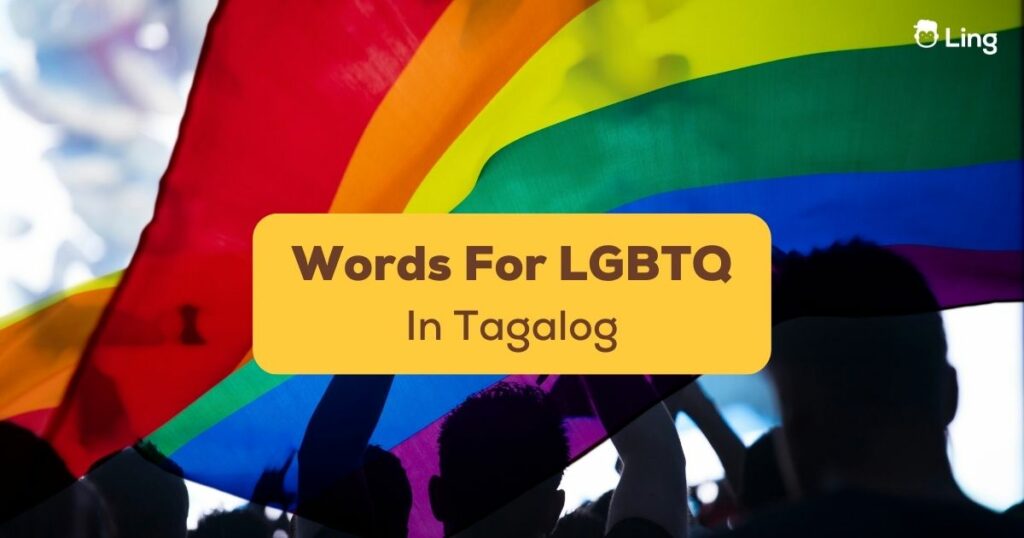
Respecting every beautiful individual in this colorful world by using inclusive language is the key to understanding and celebrating our differences. We’re swimming in a sea of diversity, where rainbows aren’t just in the sky. Respect for all people, no matter who they love or how they identify, is critical. This is far more than just being politically correct. It’s about acknowledging and celebrating our unique identities. And language plays a massive role in that. So, let’s dive right in and learn some inclusivity-loving Tagalog words for LGBTQ!
Here’s the thing about learning the Tagalog language : it’s more than just stringing words together. It’s stepping into a vibrant world packed full of stunning culture. Now, we’re diving headfirst into a rainbow of Tagalog words that celebrate the LGBT community. Think of it like a fun scavenger hunt, with each new word we find helping us understand and respect each other even more. Yay for adding more colors to our language palette! Brace yourself; this is gonna be good!
Most Common Tagalog Words For LGBTQ
Alright, let’s get down to the nitty-gritty. We’re going to look at some everyday Tagalog words that are all about the LGBTQ community.
Queer – Bakla
So, bakla is like the umbrella term that gathers everyone who doesn’t fit snugly into society’s traditional gender and sexual orientation boxes. It’s a word full of pride, embracing uniqueness and diversity. The term itself is as unique as the Philippines, originating from a combo of babae (woman) and lalaki (man). It can refer to a gay man, a queer person, or an effeminate man. Very cool, right?
Lesbian – Lesbyana
Lesbyana is simply Tagalog’s clever twist on the English word ‘lesbian.’ A popular pick to recognize women romantically drawn toward other women.
These are just two of the many Tagalog words used for LGBTQ peeps. Now, aren’t you feeling a bit more cultured already? Keep in mind, though, the crucial thing about using these words is respect and understanding. After all, love is love. Am I right?
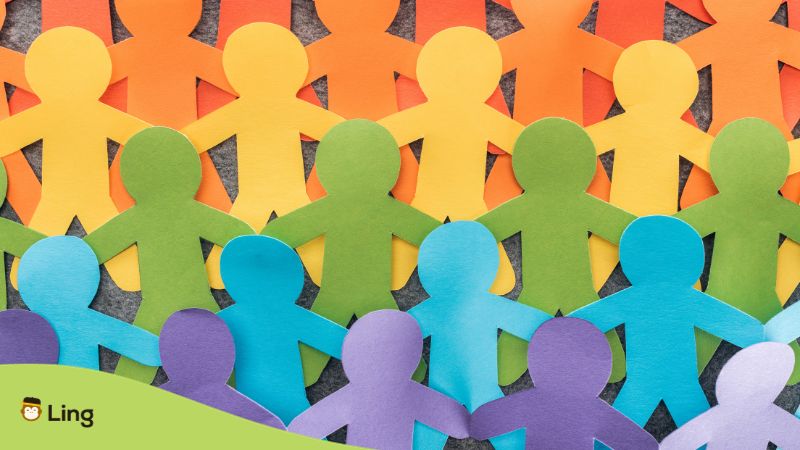
Other Tagalog Words For LGBTQ
Now, let’s get rolling on the joyride of Tagalog words for LGBTQ. It’s an adventure that will boost your understanding of The Philippines’ vibrant and diverse culture. You’ll be amazed by how the Philippines—a country famous for its daring mix of Islamic, Christian, and American influences—concocts some truly tasty and inclusive Tagalog words for LGBTQ.
Plus, you no longer need to pack your bags for a linguistic adventure! Language-learning apps like the Ling app can accompany you on this journey. Downloadable for free on your Apple and Android devices, this app’s linguistic exploration, at your fingertips, adds a new dimension to your grasp of Philippine LGBTQ terminology. So gear up for a joyous tumble down the rainbow language trail!
Homosexual Man – Bading
No firm origin for this one, but within Filipino borders, this term denotes a gay or homosexual man. Across language barriers, this cheerful expression smoothly transitions to the words “gay” or “homosexual man” in English.
Young Effeminate Man – Baklita
Baklita is an endearing term for young boys who exude feminine charm, an absolute delight with their flamboyant expressions. This term proudly features in the limelight of modern Filipino cinema , as seen in the film Ang Pagdadalaga ni Maximo Oliveros.
Made A Woman – Binabae
Binabae comes from the words Bina- (to make), and bae (woman). It is a crafty combo that may refer to transgender women. While some dictionaries consider it synonymous with Bakla, looking closely reveals that it translates to “made a woman.”
Feminine Man – Biniboy
This term is a delightful cocktail of two separate cultures. Originating from the word Binibini (translating to Miss in English) and ‘boy,’ it was used to kindly refer to gay or feminine men in the Philippines during the 50s and 60s.
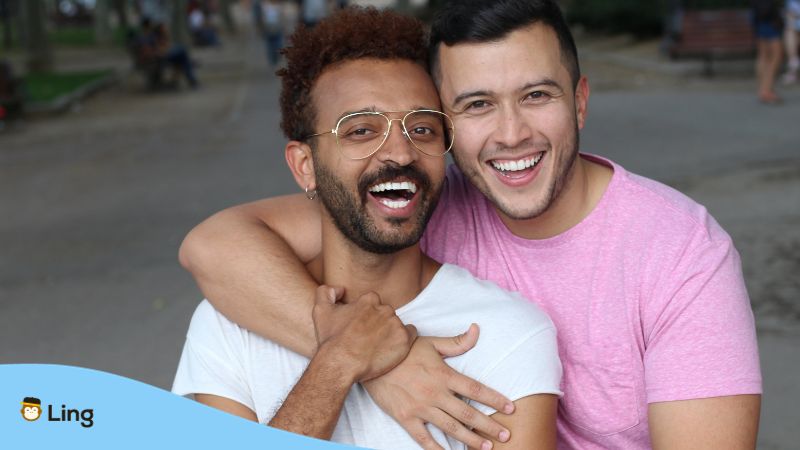
Bisexual Man – Silahis
Of Cebuano root, Silahis is metaphoric for the sun’s rays piercing through the clouds, a gorgeous spectacle indeed! Its usage has evolved in Tagalog-speak to refer to those magnificent beings whose sexual identity and orientation defy neat boxes.
Modern Gay Man – Vaklush/Vaklushii
Refreshing alternatives to the word Bakla, both Vaklush and Vaklushii have wormed their way into the gay lingo of the Philippines. These inclusive phrases put forth the idea that everyone, regardless of gender expression, adds a unique sparkle to the world’s diversity.
Constructed Male – Binalaki
Binalaki is a jazzed-up way to paint a picture of a tomboyish female or a lesbian. This term is a mix of Bina- , meaning ‘constructed’ and -laki , a snippet from lalaki , which signifies ‘man.’ So, Binalaki is like you saying – “Hey, she’s rockin’ the masculine vibe.”
Butch Lesbian – Tibo
With Tibo you’ve got the Tagalog slang version for lesbian. Yes, it’s the bee’s knees way of referring to a lesbian with a more masculine appearance and demeanor, putting a cool spin on traditionally masculine traits.
Tomboy – Tomboy
Easy one here. Tomboy in Tagalog is the same as “tomboy” in English. It’s used for gals who feel more like guys or dress in that style. Fun fact, this word has been kicking around since the Victorian era!
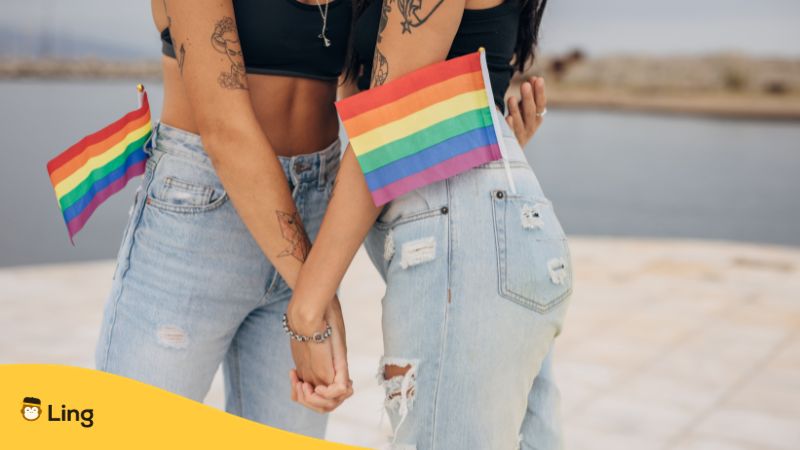

Other Words For LGBTQ With No Direct Tagalog Translation
When it comes to expressing diverse identities, the English language often introduces us to terms that don’t have a direct counterpart in Tagalog.
Imagine gender as a spectrum, and non-binary is the cool superhero who doesn’t adhere strictly to “male” or “female” categories. Non-binary individuals might feel like a little bit of both, somewhere in between, or completely off the spectrum. They’re like the unicorns of gender, bringing a magical touch to the way we understand it.
Gender Fluid
Picture a river that doesn’t follow a set path – it bends and flows freely. That’s a bit like being gender fluid. People who identify as gender fluid might feel more masculine on some days, more feminine on others, or anywhere in between.
Transgender
Imagine feeling like your true self doesn’t quite match the body you were born with. That’s the journey of a transgender person. Some of them transition to align their appearance with their gender identity. Think of it as a beautiful metamorphosis, like a butterfly emerging from a cocoon.
Love knows no bounds for a pansexual person. Pansexuals are like love’s free spirits, embracing connections with people regardless of gender. They appreciate the beautiful souls inside, no matter how they identify on the gender spectrum.
Inclusivity In Language
Can words really make a dent? They sure can, just like a sweet compliment can light up your day, or an unfortunate comment can bring you down. Words are like magic, they have the prowess to evoke emotions, and that’s precisely why trusting inclusive language is quintessential.
But what happens when we skip out on inclusivity? It’s like creating an undetectable, yet very real barrier, making folks feel excluded, unrecognized, or even overlooked. Beyond emotional upset, however, it can stoke the fires of bias and misapprehension. So, let’s practice using inclusive language because it’s all about reinforcing that everyone belongs.
In the end, isn’t that what it’s all about? Love, acceptance, and the freedom to simply be: exactly as you are, exactly who you are. If this post has resonated with you, please feel free to share it. You never know who else might benefit from these words!
Leave a Reply Cancel reply
Your email address will not be published. Required fields are marked *
Save my name, email, and website in this browser for the next time I comment.

People also read

50 Easy Thai Cooking Terms To Learn Today

30+ Easy Thai Homestay Phrases For A Fun Experience!
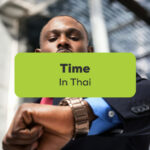
Telling The Time In Thai: 7+ Best Ways

Going To The Cinema In Thailand: A Cultural Experience
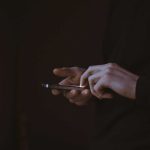
No Rosetta Stone Thai Lessons? #1 Alternative

100 Interesting Thai Surnames You Need To Know
What makes learning with ling special, interactive exercises.
Improve your pronunciation by starting a conversation with our app’s interactive chatbot
Engaging activities
Practice your skills with mini-games and track your progress with fun quizzes
Mix of languages
Choose from over 60 languages, both big and small, and listen to audio from native speakers
Proven results
Backed by linguistic research, our learning methods can help you achieve fluency in record time
Southeast Asia
East europe.
© 2024 Simya Solutions Ltd.
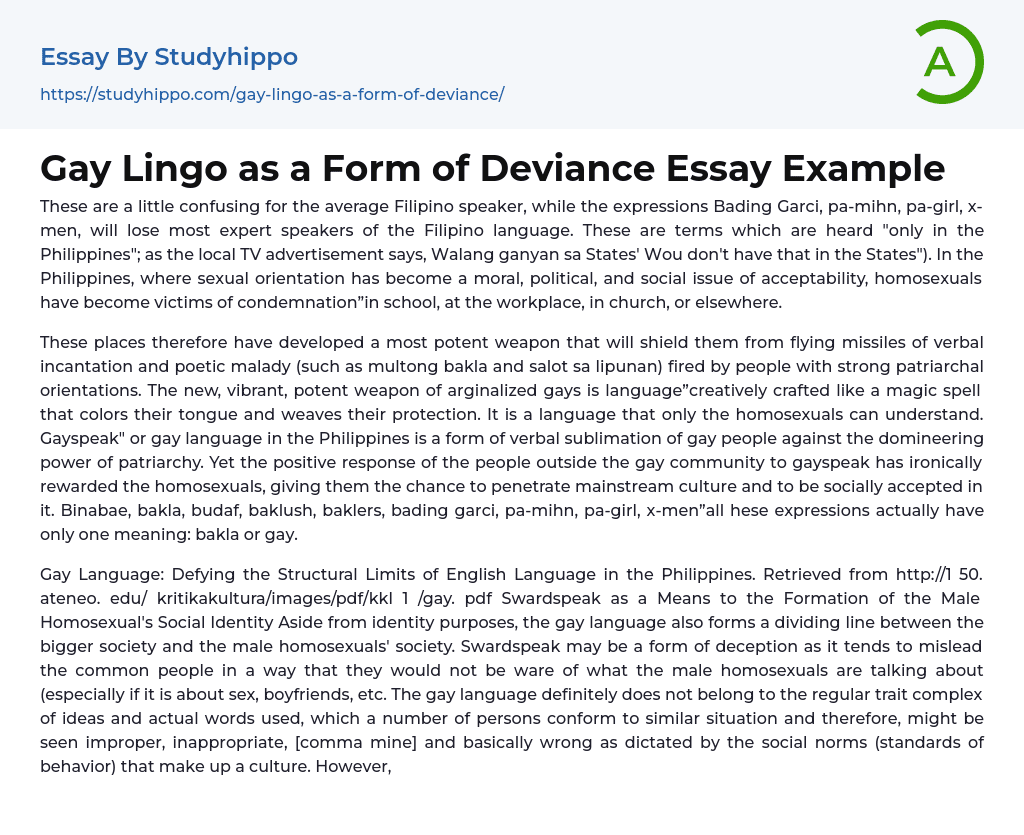
Gay Lingo as a Form of Deviance Essay Example
- Pages: 3 (784 words)
- Published: September 17, 2018
- Type: Essay
These are a little confusing for the average Filipino speaker, while the expressions Bading Garci, pa-mihn, pa-girl, x-men, will lose most expert speakers of the Filipino language. These are terms which are heard "only in the Philippines"; as the local TV advertisement says, Walang ganyan sa States' Wou don't have that in the States"). In the Philippines, where sexual orientation has become a moral, political, and social issue of acceptability, homosexuals have become victims of condemnation”in school, at the workplace, in church, or elsewhere.
These places therefore have developed a most potent weapon that will shield them from flying missiles of verbal incantation and poetic malady (such as multong bakla and salot sa lipunan) fired by people with strong patriarchal orientations. The new, vibrant, potent weapon of arginalized gays is language”creatively crafted like a magic spe
ll that colors their tongue and weaves their protection. It is a language that only the homosexuals can understand. Gayspeak" or gay language in the Philippines is a form of verbal sublimation of gay people against the domineering power of patriarchy. Yet the positive response of the people outside the gay community to gayspeak has ironically rewarded the homosexuals, giving them the chance to penetrate mainstream culture and to be socially accepted in it. Binabae, bakla, budaf, baklush, baklers, bading garci, pa-mihn, pa-girl, x-men”all hese expressions actually have only one meaning: bakla or gay.
Gay Language: Defying the Structural Limits of English Language in the Philippines. Retrieved from http://1 50. ateneo. edu/ kritikakultura/images/pdf/kkl 1 /gay. pdf Swardspeak as a Means to the Formation of the Male Homosexual's Social Identity Aside from identity purposes, the gay language also forms
dividing line between the bigger society and the male homosexuals' society. Swardspeak may be a form of deception as it tends to mislead the common people in a way that they would not be ware of what the male homosexuals are talking about (especially if it is about sex, boyfriends, etc. The gay language definitely does not belong to the regular trait complex of ideas and actual words used, which a number of persons conform to similar situation and therefore, might be seen improper, inappropriate, [comma mine] and basically wrong as dictated by the social norms (standards of behavior) that make up a culture. However, the acceptance and adaption [sic] to something which is not established or proper to one's cultural pattern marks a change brought bout by the exposure of the members to the language different from their own, their opportunity to accept it and the way the language was diffused.
Indeed, swardspeak has a way with the life of the male homosexuals [sic], for reasons important to them that common people may not know, the use of it can be considered Justifiable. But what really is swardspeak? What is it for? What implications does it have on the social environment of male homosexuals? Only very recently did social scientists investigate the social facade of male homosexuals yet Clemente, M. D. , Saavedra, M. , ; Vera-Cruz, C. (1991 , January). Swardspeak as a Means to the Formation of the Male Homosexuals' Social Identity (College Thesis).
Gay: [sic] Lingo the Reasons Behind Its Use Why do male overt homosexuals speak in such a strange tongue? What is it really that makes them use the
gay lingo or the swardspeak, as the lingo has been labeled? According to Abraham Florendo (1975), the lingo which he calls "a linguistic gymnastics", succeeds in drawing a gay person into a clique and "the clique satisfies his basic needs to belong". He also adds that the desire to belong entails a sense of freedom; where there is freedom, there are chances for personal fulfillment.
In ddition to this, Vetter (1969) stated that swardspeak can be considered as a device communicating the context of an expression and is as much as a sign of "belongingness and togetherness". The words used by homosexuals are either symbols or codes. They are understood as affirmations that one is a particular kind of person, or a fellow member of an in-group. Hence the emergence of swardspeak may be Justified in the sense that this special language indicates the homosexual's acceptability and belongingness in the confines of their own group.
Furthermore, gay lingo can also be seen as a form of rebellion against the common people or the ormal society to which they cannot conform. Homosexuals prefer to call themselves gays, have to create a world entirely their own, precisely because they belong neither to the male nor to the female sex, in order to feel even a semblance of that elusive sense of belonging (Galang, 1988). Another reason for having gay lingo is to achieve a mark of exclusivity.
- The Dynamics of Same Sex Parenting Essay Example
- Online Dating in the Gay and Lesbian Community Essay Example
- Trends and Issues in Psychology Essay Example
- Construct And Essentialist Beliefs About Homosexual Essay Example
- Men in the female dominated nursing profession Essay Example
- Linking gender differences and their effects Essay Example
- Attitudes Of University Students In Lebanon Towards Homosexuality Essay Example
- The psychology behind homosexuality and sexual orientation Essay Example
- Power Relationship Between Heterosexuals Sociology Essay Example
- Extended Definition - Gay Essay Example
- Language Analysis Gay Marriage Essay Example
- Literature Review of Queer Theory Essay Example
- Gender Roles Argumentative Essay Example
- Little Britain Essay Example
- Dont Judge Too Soon Essay Example
- Social Construction of Gender essays
- Caste System essays
- Citizenship essays
- Civil Society essays
- Community essays
- Culture essays
- Deviance essays
- Discourse Community essays
- Female essays
- Filipino People essays
- Igbo People essays
- Indigenous Australians essays
- Indigenous Peoples essays
- Middle Class essays
- Minority Group essays
- Modern Society essays
- Popularity essays
- Social Control essays
- Social Institution essays
- Social Justice essays
- Social Norms essays
- Social Responsibility essays
- Socialization essays
- The nation essays
- Gender essays
- Gender Identity essays
- Gender Roles In Society essays
- Gender Stereotypes essays
- Girl essays
- Homosexuality essays
- Human Sexual Behavior essays
- Lgbt essays
- Masculinity essays
- Sexual Orientation essays
- Transgender essays
- Woman essays
Haven't found what you were looking for?
Search for samples, answers to your questions and flashcards.
- Enter your topic/question
- Receive an explanation
- Ask one question at a time
- Enter a specific assignment topic
- Aim at least 500 characters
- a topic sentence that states the main or controlling idea
- supporting sentences to explain and develop the point you’re making
- evidence from your reading or an example from the subject area that supports your point
- analysis of the implication/significance/impact of the evidence finished off with a critical conclusion you have drawn from the evidence.
Unfortunately copying the content is not possible
Tell us your email address and we’ll send this sample there..
By continuing, you agree to our Terms and Conditions .
Meeting Deadlines
Is essay writing service legal.
Essay writing services are legal if the company has passed a number of necessary checks and is licensed. This area is well developed and regularly monitored by serious services. If a private person offers you his help for a monetary reward, then we would recommend you to refuse his offer. A reliable essay writing service will always include terms of service on their website. The terms of use describe the clauses that customers must agree to before using a product or service. The best online essay services have large groups of authors with diverse backgrounds. They can complete any type of homework or coursework, regardless of field of study, complexity, and urgency.
When you contact the company Essayswriting, the support service immediately explains the terms of cooperation to you. You can control the work of writers at all levels, so you don't have to worry about the result. To be sure of the correctness of the choice, the site contains reviews from those people who have already used the services.

Why do I have to pay upfront for you to write my essay?

Finished Papers
Estelle Gallagher
These kinds of ‘my essay writing' require a strong stance to be taken upon and establish arguments that would be in favor of the position taken. Also, these arguments must be backed up and our writers know exactly how such writing can be efficiently pulled off.
Essay Writing Service
Have a native essay writer do your task from scratch for a student-friendly price of just per page. Free edits and originality reports.
Customer Reviews
- Share full article
Advertisement
Supported by
Guest Essay
The Age of the Open Letter Should End

By Roxane Gay
Contributing Opinion Writer
Once upon a time, it is often suggested, people with starkly different viewpoints were able to convene and compromise and find hallowed common ground. This all happened in a “better time,” one invoked in fraught political discussions in which the discourse is not happening in exactly the way the invoker prefers. If only we could get back to that place, we could solve all our problems. We could overcome our differences. We could create lasting change.
It’s easy to look upon the past with rose-colored glasses, to assume that whatever compromises people were once able to make came easily to well-mannered gentlemen and perhaps a few gentlewomen engaged in debates. Our assumption that the past was more civil is such a beautiful lie, one that serves only the people so desperately willing to believe it.
Open letters are not new; they have served as rhetorical tools for at least two centuries, from Émile Zola’s “J’accuse” to the Rev. Dr. Martin Luther King Jr.’s “Letter From Birmingham Jail.” As a means of personal empowerment, they allow people to use their voices, to advocate causes for which they hold affinity, to bring attention to important social issues, to express outrage, to defend decisions, to chastise ignorance, to affirm humanity. Open letters are persuasive arguments, but they are also entreaties. Please, hear me, the writers of open letters implore. Please act. Please change. Please.
I am not a fan of open letters, though I recognize their value. I’ve signed a few over the years because doing so felt urgent and necessary. But once the letter was released, I felt a little lost and had no idea where to put the energy of the letter and its pleas. The open letter, as a genre is, in this way, far too limited. We speak with conviction, and then what?
We need not have solutions to every issue we bring attention to, but the constant volley of open letters does not really address the problems with which they are concerned. In some cases, these letters only encourage audiences to become even more attached to their convictions. If, in the best case, an open letter really influences people to change their minds, where do they go with their newfound perspectives? If an open letter offers practical steps forward, how does it create space for what happens after we vote or bring awareness about an issue to our social circles?
In 1962, James Baldwin wrote a searing letter in which he grappled with the fraught, racist future into which his nephew would come of age. Mr. Baldwin wrote, “You were born where you were born and faced the future that you faced because you were black and for no other reason. The limits to your ambition were thus expected to be settled. You were born into a society which spelled out with brutal clarity and in as many ways as possible that you were a worthless human being. You were not expected to aspire to excellence. You were expected to make peace with mediocrity.”
This was a message for his nephew, but it was also for any Black person or other person of color trying to reconcile the realities of racism. And it was a reckoning for a white audience about the ways bigotry seeks to limit the Black imagination. That’s the beauty of open letters: There is your intended audience and then all the ancillary audiences to which you have access, by virtue of the open message.
But open letters are not always as profound or noble or edifying. At their worst, they are thinly veiled opportunities for the writer(s) to air grievances to like-minded individuals or share unfiltered, unrefined opinions of little substance. They purport to reach a specific audience for a specific reason, but really, these letters are often undisciplined monologues. The writers are preachers, standing at powerful pulpits, all call and little interest in response.
Before the rise of the internet, open letters could have a significant impact because most people had few avenues for expressing their ideas to a large audience. But now, when we send a tweet or post an image on Instagram or make a TikTok, we are, in a sense, sharing a tiny open letter. Please, we say, please hear me. Please see me.
I cannot nor would not dare try to adjudicate a decades-long conflict no person or entity has ever been able to resolve. But over the past several months, I have been struck by the sheer number of open letters various individuals and groups have written in support of Israel, in support of the Palestinians, in support of war, against war, demanding cease-fire, rejecting cease-fire and on and on.
Instead of having conversations, many people have taken to talking at their intended audiences, composing arguments as unimpeachably as possible and trusting that little more needs to be said. Or, because someone else has done the work of crafting an argument, people co-sign a letter’s sentiments without having to expend unnecessary effort or original thought — all reward, little risk.
We are six months past Oct. 7 and the brutal Hamas incursions into Israel. Hamas is still holding more than 100 hostages. At least 33,000 Palestinians, according to the local Health Ministry, have been killed by Israeli military attacks. There is no end in sight to the hostilities. A great many of us are feeling helpless in the face of such an intractable conflict. We want to say and do the right thing without necessarily knowing what that looks like. Open letters have allowed us to scream into the void, innumerable calls begging for some kind of response that might bring an end to so much suffering.
Open letters about Gaza are not a recent phenomenon. In 2014, physicians and scientists wrote a letter for the people of Gaza, denouncing Israeli aggression. In December 2023, Doctors Without Borders and other humanitarian groups wrote an open letter to the U.S. secretary of defense, Lloyd J. Austin, sharing concerns about the civilian casualties of war and requesting that the United States take steps to protect civilians in Gaza. Jewish elected officials in New York wrote a letter, articulating the effects the war has had on their constituents and urging the Israeli government to find a peaceful resolution and protect Palestinians from settler violence. Museum employees and volunteers at the Metropolitan Museum of Art wrote an open letter encouraging the museum to call for an end to the bombing in Gaza and showcase more Palestinian artwork. Workers at several other museums took similar stands. American political appointees wrote an open letter decrying President Biden’s stance on Israel.
These open letters are not solely an American endeavor. More than 60 nongovernmental agencies in Britain wrote an open letter to members of Parliament about the extent of the humanitarian crisis in Gaza and requesting support for a cease-fire motion. Journalists from around the world have written open letters in support of Palestinian journalists and demanding better access to Gaza to report on the destruction and demanding that media outlets more effectively and accurately report on the brutal realities of the war.
In Hollywood there has been a slew of open letters. In one such letter, released days after Oct. 7, actors and entertainment industry executives wrote passionately in defense of Israel, condemned Hamas and demanded the release of the Israeli hostages. In another, actors and artists wrote an open letter to Mr. Biden, calling for a cease-fire. Poets and writers have written open letters, and so have university faculty, lawyers, artists and art workers, philanthropists, college students, researchers, congressional staff members, philosophers and even Holocaust survivors .
Each open letter, no matter what stance it adopts, is earnest, incisive and unequivocal. All the writers and co-signers believe they are right and know the best way forward. As the war continues, so does this chorus of open letters. They are coalescing into a historical record of how people are responding to one of the greatest humanitarian crises of our lifetimes. We need this record, but we also need so much more.
As with the conflict itself, there is, seemingly, little common ground beyond a collective desire to speak and be heard and remain confident in one’s correctitude. This reveals one of the biggest weaknesses of the open letter. We know what the writers of these letters think and feel. We know what they want. But we don’t really know if anyone is listening. We don’t know how to translate those words into meaningful action. We don’t know what could happen if, instead of talking at one another by way of open letters, we found better ways to talk with and listen, truly listen, to one another — to participate in both the call and the response.
Change is difficult. It is incremental. Sometimes, compromise and progress demand sacrifice. Rarely do all people get everything they want. And, I suspect, that’s why we keep turning to open letters. They may not lead to workable solutions, but they do allow us to speak. They won’t provide food and medical care to the people of Gaza, and they won’t bring the hostages home or bring about a cease-fire, but we can articulate what we want without having to engage in the messy and unsatisfying but necessary work of compromise. We can hold fast to our deeply held beliefs without having to question them or grapple with doubt. We can mitigate any helplessness with performance rather than practice.
The Times is committed to publishing a diversity of letters to the editor. We’d like to hear what you think about this or any of our articles. Here are some tips . And here’s our email: [email protected] .
Follow the New York Times Opinion section on Facebook , Instagram , TikTok , WhatsApp , X and Threads .
Roxane Gay is the author, most recently, of “Opinions: A Decade of Arguments, Criticism, and Minding Other People’s Business” and a contributing Opinion writer. Write to her at [email protected] . @ RGay
- Skip to main content
- Keyboard shortcuts for audio player
NPR defends its journalism after senior editor says it has lost the public's trust

David Folkenflik

NPR is defending its journalism and integrity after a senior editor wrote an essay accusing it of losing the public's trust. Saul Loeb/AFP via Getty Images hide caption
NPR is defending its journalism and integrity after a senior editor wrote an essay accusing it of losing the public's trust.
NPR's top news executive defended its journalism and its commitment to reflecting a diverse array of views on Tuesday after a senior NPR editor wrote a broad critique of how the network has covered some of the most important stories of the age.
"An open-minded spirit no longer exists within NPR, and now, predictably, we don't have an audience that reflects America," writes Uri Berliner.
A strategic emphasis on diversity and inclusion on the basis of race, ethnicity and sexual orientation, promoted by NPR's former CEO, John Lansing, has fed "the absence of viewpoint diversity," Berliner writes.
NPR's chief news executive, Edith Chapin, wrote in a memo to staff Tuesday afternoon that she and the news leadership team strongly reject Berliner's assessment.
"We're proud to stand behind the exceptional work that our desks and shows do to cover a wide range of challenging stories," she wrote. "We believe that inclusion — among our staff, with our sourcing, and in our overall coverage — is critical to telling the nuanced stories of this country and our world."

NPR names tech executive Katherine Maher to lead in turbulent era
She added, "None of our work is above scrutiny or critique. We must have vigorous discussions in the newsroom about how we serve the public as a whole."
A spokesperson for NPR said Chapin, who also serves as the network's chief content officer, would have no further comment.
Praised by NPR's critics
Berliner is a senior editor on NPR's Business Desk. (Disclosure: I, too, am part of the Business Desk, and Berliner has edited many of my past stories. He did not see any version of this article or participate in its preparation before it was posted publicly.)
Berliner's essay , titled "I've Been at NPR for 25 years. Here's How We Lost America's Trust," was published by The Free Press, a website that has welcomed journalists who have concluded that mainstream news outlets have become reflexively liberal.
Berliner writes that as a Subaru-driving, Sarah Lawrence College graduate who "was raised by a lesbian peace activist mother ," he fits the mold of a loyal NPR fan.
Yet Berliner says NPR's news coverage has fallen short on some of the most controversial stories of recent years, from the question of whether former President Donald Trump colluded with Russia in the 2016 election, to the origins of the virus that causes COVID-19, to the significance and provenance of emails leaked from a laptop owned by Hunter Biden weeks before the 2020 election. In addition, he blasted NPR's coverage of the Israel-Hamas conflict.
On each of these stories, Berliner asserts, NPR has suffered from groupthink due to too little diversity of viewpoints in the newsroom.
The essay ricocheted Tuesday around conservative media , with some labeling Berliner a whistleblower . Others picked it up on social media, including Elon Musk, who has lambasted NPR for leaving his social media site, X. (Musk emailed another NPR reporter a link to Berliner's article with a gibe that the reporter was a "quisling" — a World War II reference to someone who collaborates with the enemy.)
When asked for further comment late Tuesday, Berliner declined, saying the essay spoke for itself.
The arguments he raises — and counters — have percolated across U.S. newsrooms in recent years. The #MeToo sexual harassment scandals of 2016 and 2017 forced newsrooms to listen to and heed more junior colleagues. The social justice movement prompted by the killing of George Floyd in 2020 inspired a reckoning in many places. Newsroom leaders often appeared to stand on shaky ground.
Leaders at many newsrooms, including top editors at The New York Times and the Los Angeles Times , lost their jobs. Legendary Washington Post Executive Editor Martin Baron wrote in his memoir that he feared his bonds with the staff were "frayed beyond repair," especially over the degree of self-expression his journalists expected to exert on social media, before he decided to step down in early 2021.
Since then, Baron and others — including leaders of some of these newsrooms — have suggested that the pendulum has swung too far.

Author Interviews
Legendary editor marty baron describes his 'collision of power' with trump and bezos.
New York Times publisher A.G. Sulzberger warned last year against journalists embracing a stance of what he calls "one-side-ism": "where journalists are demonstrating that they're on the side of the righteous."
"I really think that that can create blind spots and echo chambers," he said.
Internal arguments at The Times over the strength of its reporting on accusations that Hamas engaged in sexual assaults as part of a strategy for its Oct. 7 attack on Israel erupted publicly . The paper conducted an investigation to determine the source of a leak over a planned episode of the paper's podcast The Daily on the subject, which months later has not been released. The newsroom guild accused the paper of "targeted interrogation" of journalists of Middle Eastern descent.
Heated pushback in NPR's newsroom
Given Berliner's account of private conversations, several NPR journalists question whether they can now trust him with unguarded assessments about stories in real time. Others express frustration that he had not sought out comment in advance of publication. Berliner acknowledged to me that for this story, he did not seek NPR's approval to publish the piece, nor did he give the network advance notice.
Some of Berliner's NPR colleagues are responding heatedly. Fernando Alfonso, a senior supervising editor for digital news, wrote that he wholeheartedly rejected Berliner's critique of the coverage of the Israel-Hamas conflict, for which NPR's journalists, like their peers, periodically put themselves at risk.
Alfonso also took issue with Berliner's concern over the focus on diversity at NPR.
"As a person of color who has often worked in newsrooms with little to no people who look like me, the efforts NPR has made to diversify its workforce and its sources are unique and appropriate given the news industry's long-standing lack of diversity," Alfonso says. "These efforts should be celebrated and not denigrated as Uri has done."
After this story was first published, Berliner contested Alfonso's characterization, saying his criticism of NPR is about the lack of diversity of viewpoints, not its diversity itself.
"I never criticized NPR's priority of achieving a more diverse workforce in terms of race, ethnicity and sexual orientation. I have not 'denigrated' NPR's newsroom diversity goals," Berliner said. "That's wrong."
Questions of diversity
Under former CEO John Lansing, NPR made increasing diversity, both of its staff and its audience, its "North Star" mission. Berliner says in the essay that NPR failed to consider broader diversity of viewpoint, noting, "In D.C., where NPR is headquartered and many of us live, I found 87 registered Democrats working in editorial positions and zero Republicans."
Berliner cited audience estimates that suggested a concurrent falloff in listening by Republicans. (The number of people listening to NPR broadcasts and terrestrial radio broadly has declined since the start of the pandemic.)
Former NPR vice president for news and ombudsman Jeffrey Dvorkin tweeted , "I know Uri. He's not wrong."
Others questioned Berliner's logic. "This probably gets causality somewhat backward," tweeted Semafor Washington editor Jordan Weissmann . "I'd guess that a lot of NPR listeners who voted for [Mitt] Romney have changed how they identify politically."
Similarly, Nieman Lab founder Joshua Benton suggested the rise of Trump alienated many NPR-appreciating Republicans from the GOP.
In recent years, NPR has greatly enhanced the percentage of people of color in its workforce and its executive ranks. Four out of 10 staffers are people of color; nearly half of NPR's leadership team identifies as Black, Asian or Latino.
"The philosophy is: Do you want to serve all of America and make sure it sounds like all of America, or not?" Lansing, who stepped down last month, says in response to Berliner's piece. "I'd welcome the argument against that."
"On radio, we were really lagging in our representation of an audience that makes us look like what America looks like today," Lansing says. The U.S. looks and sounds a lot different than it did in 1971, when NPR's first show was broadcast, Lansing says.
A network spokesperson says new NPR CEO Katherine Maher supports Chapin and her response to Berliner's critique.
The spokesperson says that Maher "believes that it's a healthy thing for a public service newsroom to engage in rigorous consideration of the needs of our audiences, including where we serve our mission well and where we can serve it better."
Disclosure: This story was reported and written by NPR Media Correspondent David Folkenflik and edited by Deputy Business Editor Emily Kopp and Managing Editor Gerry Holmes. Under NPR's protocol for reporting on itself, no NPR corporate official or news executive reviewed this story before it was posted publicly.

IMAGES
VIDEO
COMMENTS
Gay lingo in the Phili ppines pertains to the coina ge of new words throu gh using . ... contested classic 1964 essay, "Notes on 'Camp'." The word itself, which may derive .
A researcher-made questionnaire was used in this study. The questionnaire was composed of the socio-demographic profile, Communication characteristics, Factors influencing the usage of gay lingo, the extent of utilization, and effects of gay lingo. Findings show that the majority of the millennials are using gay lingo as a way of communicating.
Its roots stem from a time when the Filipino LGBTQ+ community hid behind the shield of the language to keep themselves safe. "People [used to] practice gay lingo to create a space for [the community] without the fear of other people eavesdropping on their conversations," Singh says. A secret language of sorts, it exists to conceal the true ...
on gay and lesbian language consists of lists of in-group terms, discussion of terms for "homosexual," debates about the pros and cons of words like "gay" and "queer," or possible etymologies of words like "sod," "dyke," or "closet." This is. Spears 1985; Stone 1981).
Abstract. "Gay Lingo as Reflection of Social Identity" explores the use of gay lingos as word substitutes in conversations. Frameworks were based on Social Identity Theory [ 4 ], Sociolinguistics by [ 1 ],Queer Theory [ 5 ], and Sociolinguistics of [ 6 ]. Methods used were Descriptive-qualitative design and quantitative approach.
Academia.edu is a platform for academics to share research papers. Stylistics Variation: Understanding Gay Lingo in Social Perspectives (PDF) Stylistics Variation: Understanding Gay Lingo in Social Perspectives | Helen Espeno Rosales - Academia.edu
You may read the essay here. However, we will only focus on two additional points raised in the essay. The Philippine gay lingo has the capacity to disrupt, and that it is forever advent, forever beginning, forever new. While the language is no longer as exclusive as it was back then, notwithstanding the power of mainstream media and ...
Most research in the 1940s and 1950s focused on lexical descriptions used primarily by gay men, providing lists of slang and argot used within gay communities. While theoretical linguistic analysis was often absent in the earliest works, authors in the 1950s and 1960s began to speculate about the social utility of gay slang.
One can see this in the vast vocabulary of Filipino gay lingo or swardspeak. Ronald Baytan in his essay "Language, Sex, and Insults: Notes on Garcia and Remoto's The Gay Dict" describes the creation of gay lingo as "gays turning the source of their oppression, their desires, into the very source of their self-affirmation."
This essay explores how student members of an LGBTQ+ rights organisation discursively navigate queer identifications and concepts of belonging, based on fieldwork conducted in Quezon City, Philippines. I argue that elements of 'gay lingo', one of many Filipino LGBTQ+ argots, establish interlocutors as members of both LGBTQ+ communities and 'post-colonial' Philippines at large, amidst ...
Abstract. This study was conducted to identify factors influencing the usage of gay lingo among millenials as a way of communicating. It also aimed to determine the extent of utilization and the ...
Sa paggamit ng mga salitang katunog lamang o pangngalang pantangi sa gay lingo ay lihis agad sa kahulugang denotasyon. Ang gay lingo ay may malaking respeto at nagtataas ng moral ng kababaihan batay sa mga salitang bahagi ng wikang ito na may kaugnayan at kinalaman sa mga babae (Suguitan, 2005).
Her essay about it says that she had learned it when she was associating with University of the Philippine's resident members. She explained that she had no intention of speaking queer being the grammar geek that she is but she just couldn't help to adapt gay lingo during her stay in UP. Gay lingo is very influecial.
Gay Language. Gay language which is sometimes called as "gay lingo" has achieved a high degree of acceptance in these recent years in the Philippines. Both gays and non-gays can be heard uttering gay expressions. It's also spreading widely in our country. The propagation of this language and form of communication is unstoppable.
1.2.1 Historical Background. Filipino gay language or swardspeak language is a vernacular language derived from Englog (English- Tagalog) and is used by a number of gay Filipinos. It uses elements from Tagalong, English, Spanish, Niponggo, from celebrities' names and signature brands hat giving a new context of this unique language. A unique ...
Constructed Male - Binalaki. Binalaki is a jazzed-up way to paint a picture of a tomboyish female or a lesbian. This term is a mix of Bina-, meaning 'constructed' and -laki, a snippet from lalaki, which signifies 'man.'. So, Binalaki is like you saying - "Hey, she's rockin' the masculine vibe.".
10. Beki. Slang Terms, Translated. We're pretty sure you've heard a lot of these by now. If you've been wondering what they mean, look no further. by Jeremiah Capacillio. Published May 4, 2018. ILLUSTRATOR War Espejo. (SPOT.ph) With a transgender woman in Congress and the immense popularity of shows like Queer Eye and RuPaul's Drag Race, gay ...
In Philippine gay lingo, "Winona Ryder" means "to win," referring to a gay man lucky in both life and love. The American TV talkshow host "Oprah Winfrey" has unwittingly lent her name ...
According to Cage, the term "language" here, is used not as a constructed language with its own grammar, syntax, morphology and phonology, but in the same way as linguists would discuss women's language, which the gay lingo doesn't follow grammar rules in constructing English sentence they create new form of words as well as the meaning of the words.
Essay About Gay; Essay About Gay. Sort By: Page 1 of 50 - About 500 essays. Decent Essays. Gay And Gay Rights. 888 Words; 4 Pages; Gay And Gay Rights ... But then again as a slang word in the LGBT community it means homosexual or noting or relating to a person who does not conform to a normative sexual orientation or gender identity. The ...
Gay Lingo as a Form of Deviance Essay Example. These are a little confusing for the average Filipino speaker, while the expressions Bading Garci, pa-mihn, pa-girl, x-men, will lose most expert speakers of the Filipino language. These are terms which are heard "only in the Philippines"; as the local TV advertisement says, Walang ganyan sa States ...
Gay Lingo Essay. Progressive delivery is highly recommended for your order. This additional service allows tracking the writing process of big orders as the paper will be sent to you for approval in parts/drafts* before the final deadline. A personal order manager. * You can read more about this service here or please contact our Support team ...
They tend to 'do my essay' by adding value to both you (enhancing your knowledge) and your paper. View Sample. 1(888)814-4206 1(888)499-5521. ... Gay Lingo Essay, Cover Letter For Writing Submissions, How To See The Words In Your Essay In Google Docs, Caleb Ryder Dissertation, Help With My Esl Creative Essay On Usa, Pay To Get Top Biography ...
Follow the New York Times Opinion section on Facebook, Instagram, TikTok, WhatsApp, X and Threads. Roxane Gay is the author, most recently, of "Opinions: A Decade of Arguments, Criticism, and ...
Berliner says in the essay that NPR failed to consider broader diversity of viewpoint, noting, "In D.C., where NPR is headquartered and many of us live, I found 87 registered Democrats working in ...